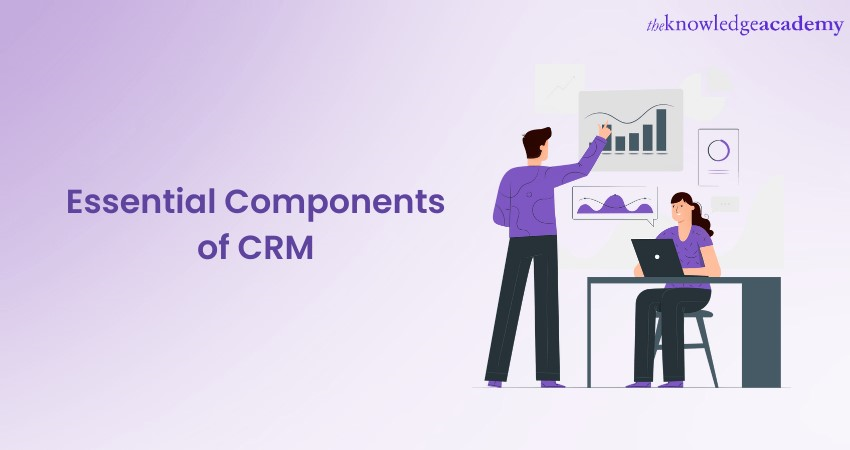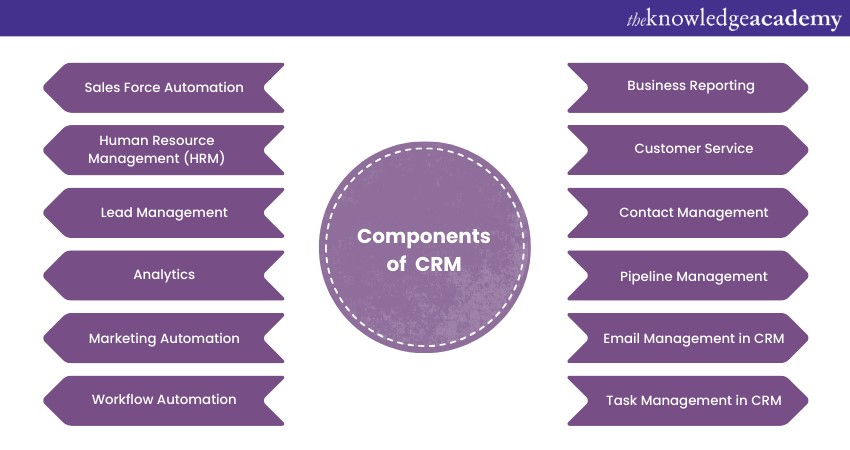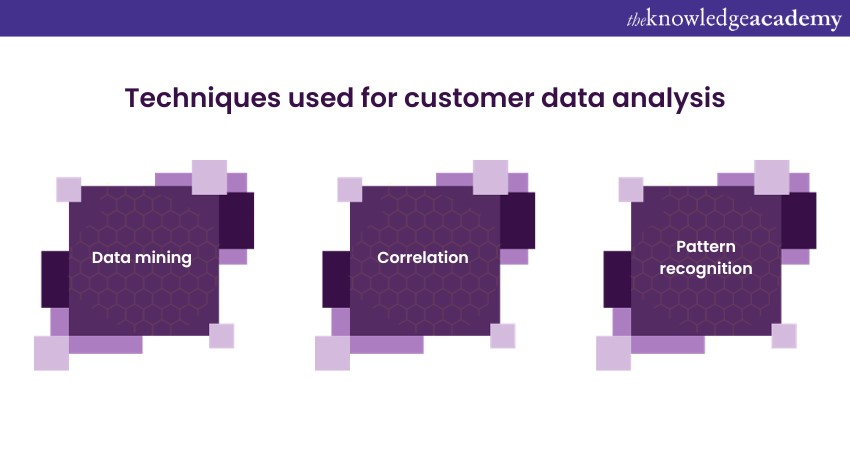We may not have the course you’re looking for. If you enquire or give us a call on 01344203999 and speak to our training experts, we may still be able to help with your training requirements.
We ensure quality, budget-alignment, and timely delivery by our expert instructors.

Customer Relationship Management (CRM) holds significant value for companies due to its streamlined means of accessing and analysing customer data within their client base. This, in turn, facilitates the enhancement of customer loyalty, profitability, and overall satisfaction.
The Components of the CRM, such as Sales Force Automation, Human Resource Management (HRM), and Lead Management, help ensure organisational success and drive profitability. This blog covers the essential Components of CRM that you must know and comprehensively looks into each factor. Read further to learn more.
Table of Contents
1) The importance of Customer Relationship Management
2) Components of Customer Relationship Management (CRM) system
a) Sales Force Automation
b) Human Resource Management (HRM)
c) Lead Management
d) Analytics
e) Marketing Automation
f) Workflow Automation
g) Business Reporting
h) Customer Service
i) Contact Management
j) Pipeline Management
k) Email Management in CRM
l) Task Management in CRM
3) Conclusion
The importance of Customer Relationship Management
CRM software allows the tracking of essential customer data, including information related to:
1) Purchasing behaviour
2) Referral patterns
3) Customer interests
4) Demographic information
By harnessing this data, companies can make more informed and strategic business decisions. They can leverage this knowledge to tailor their products and services to meet Customer needs better, thereby increasing the likelihood of customer retention and encouraging them to refer potential customers to the company. When considering CRM or ITSM, it's crucial to note that while CRM focuses on customer relationships and retention, ITSM is more concerned with managing and improving IT services, ensuring both customer satisfaction and operational efficiency.
Components of Customer Relationship Management (CRM) system
The scope of CRM extends beyond sales, marketing, and customer service, encompassing various other components that not only enhance your sales and marketing initiatives but also bolster customer loyalty. It is worth noting that Human Relationship Management (HRM) plays a crucial role in ensuring the success of CRM. For a complete overview, check the CRM Guide covering key aspects of customer relationship management. The following are the Components of CRM:

1) Sales Force Automation
Sales Force Automation (SFA) is one of the Components of CRM. It constitutes a fundamental element of CRM. Sales represent a critical aspect of any business. Various software tools are available for sales forecasting, processing, and record-keeping functions. SFA integrates these functionalities, ultimately leading to cost savings for your business.
The advantages of incorporating Sales Force Automation (SFA) within your CRM framework are as follows:

a) Enhanced revenue generation: SFA empowers organisations to identify and capitalise on additional revenue opportunities. With sales processes around the clock, you can secure more sales, ultimately boosting your revenue.
b) Streamlined sales cycle: SFA offers automation throughout your entire sales cycle, commencing from the initial prospecting of leads and culminating in successful sales closure.
c) Elevated customer satisfaction: Many businesses grapple with fine-tuning their customer service processes. SFA not only optimises your sales procedures but also contributes to heightened customer satisfaction and increased customer loyalty and value.
2) Human Resource Management (HRM)
The most crucial asset for any company resides not in its infrastructure but within its people. HRM is considered one of the Components of CRM. When HR representatives are actively engaged within your CRM system, it can transform the company's culture towards a heightened customer-centric approach. The bedrock of effective CRM lies in the organisation's ability to cultivate a customer-oriented culture that permeates its everyday activities.
To achieve CRM's full potential, the company must wholeheartedly embrace this customer-focused culture and weave it into the fabric of its daily operations. In doing so, it recognises the pivotal role of human resources in fostering customer-centricity and driving the company towards more tremendous success.
Master the concept of Salesforce administration with Salesforce Admin Course!
3) Lead Management
Lead Management encompasses drawing in, overseeing, and transforming potential sales prospects into satisfied paying clientele.
It being one of the Components of CRM sets its objective to convert a prospective customer into a devoted and loyal patron. While numerous businesses excel at the initial phase of customer acquisition, a mere fraction possesses the adeptness to proficiently nurture and oversee these prospects until they evolve into engaged customers.
An efficient Lead Management initiative includes:
a) Constructing dedicated landing pages
b) Crafting tailor-made forms
c) Establishing and managing mailing lists
4) Analytics
Analytics serves as one of the Components of CRM, offering a comprehensive examination of your customer data. The collection of customer data only holds significance with the subsequent processing and actionable measures. The primary objective of incorporating analytics into CRM is the enhancement of customer retention and satisfaction.
Analytical CRM systems employ various methods to scrutinise the wealth of customer data at your disposal. Business Managers harness analytics to make well-informed decisions concerning customers and broader business operations.
The techniques utilised for customer data analysis include the following:

a) Data mining
b) Correlation
c) Pattern recognition
The acquired data within your CRM database can be effectively represented through various means, including histograms, charts, numerical figures, and diagrams.
5) Marketing Automation
Marketing is a crucial component of CRM and plays a vital role in business growth. Marketing departments utilise various tools to enhance brand recognition, boost sales, and increase revenue. A/B testing and Marketing Automation software are powerful resources that can help create highly effective marketing campaigns.
The primary objective of incorporating Marketing Automation into CRM is streamlining repetitive tasks encountered by your team throughout the customer journey. These encompass various marketing responsibilities, such as:
a) Management of lists
b) Handling of documents
c) Oversight of activities
d) Call management
e) Campaign administration
f) Dispatching mass emails
g) Generating comprehensive reports
6) Workflow Automation
Workflow Automation plays a pivotal role in structuring processes and is one of the key components of CRM that can contribute to cost savings in deployments. It helps to prevent redundancy by ensuring that tasks are not assigned to multiple individuals. Currently, organisations waste valuable productivity hours on repetitive workflow tasks. To implement Workflow Automation effectively, it is imperative to have the appropriate and enduring CRM technology. CRM software tools are essential to automate workflows, saving significant time and resources.
Learn how to manage and automate your sales process with HubSpot CRM Training and stay ahead of the learning curve!
7) Business Reporting
Business Reporting is one of the Components of CRM, presenting users with reports featuring visual elements for tracking data trends over time. By juxtaposing historical data and predicting future performance, users can glean valuable insights into their business operations.
The report function allows users to export data to other systems, facilitating data tracking and forecasting for forthcoming periods. Proficiency in creating CRM reports is of paramount importance as reports enhance the processes of marketing and customer support departments while also delivering valuable insights to business stakeholders about the company's financial health and revenue patterns.
These reports must be readily accessible and viewable from various perspectives. Centralising this information enables executives to conveniently oversee multiple departments simultaneously.
8) Customer Service
Customer Service is one of the Components of CRM. Dedicated customers are invaluable assets for any company. Within CRM, Customer Service is a pivotal component that enhances and nurtures customer relationships. The gauge of your customer service success lies in measuring the loyal customers you retain.
In every company, the presence of Customer Service representatives who offer exceptional customer support is critical. CRM equips these representatives with valuable insights into customer preferences. A proficient Customer Service team utilises this information to provide timely customer assistance, leveraging data on their purchase history and interests to foster more meaningful and effective interactions.
9) Contact Management
Contact Management, one of the Components of CRM, serves as a consolidation point for business contacts originating from diverse communication channels. Do you need up-to-the-minute details regarding your team's most recent interaction with a customer and the context of that engagement? The role of contact management in CRM is to provide you with precisely this information.
It offers comprehensive insights into the optimal timing for reaching your customers. Managing your customer base effectively becomes a straightforward endeavour, especially when preparing for CRM Interview Questions that focus on strategies and tools for success. A robust CRM software can proficiently oversee your contacts, interactions across social media platforms, and email correspondences.
10) Pipeline Management
Pipeline Management is one of the Components of CRM. An effective CRM system enables businesses to oversee their sales cycle efficiently. Each sales cycle commences at the stage of potential leads and culminates at the point of conversion.
Sales Pipeline Management constitutes a critical facet of every CRM system. Through a proficient CRM, your company can aggregate various leads from various communication channels.
Upon acquiring these leads, the sales pipeline functionality identifies the most qualified prospects and discerns potential sales opportunities.
Learn how to enable CRM analytics and assign permissions to administrators and users with our Salesforce CRM Masterclass
11) Email Management in CRM
Effective Email Management is one of CRM's components in any organisation's marketing endeavours. A proficient CRM system provides essential tools for efficiently overseeing and administrating your business-related emails.
It is advisable to steer clear of any CRM lacking Email Management capabilities. To streamline your Email Management, you can seamlessly integrate your email marketing tools with your CRM account.
Integrating your email provider into your CRM system eliminates the need to navigate between multiple tabs to access your emails, saving both time and effort.
A well-designed Email Management system places a premium on prioritising your emails and scrutinises every response. It also automates follow-up actions whenever a prospect or lead takes specific actions.
Gain an understanding of Apex programming language with syntax through our Salesforce Apex Programming Language Training
12) Task Management in CRM
Task Management is one of the Components of CRM, serving as the linchpin for orchestrating your business procedures and workflow. Organisations harness this feature to regulate tasks and foster enhanced teamwork aptly.
Managers leverage the Task Management feature within the CRM platform to delegate assignments to specific team members directly. This functionality also enables you to access a comprehensive overview of the various assigned tasks and effectively oversee your team's workload.
The utility of Task Management lies in its capacity to structure your activities, enabling your sales teams to give precedence to crucial deals. In doing so, your business not only economises time and resources but also diverts efforts away from mundane tasks that make marginal contributions to your overarching business objectives.
Conclusion
In conclusion, various Components of CRM allow customisation to tailor organisations' systems to align with their preferences. This includes personalising custom layouts, functions, modules, fields, and buttons. The capability to construct a bespoke CRM system that caters to the distinct requirements and choices of the organisation is essential. An optimal CRM system should exhibit the ability for customisation, ensuring it accommodates the preferences and requirements of the sales team effectively.
Learn how to create, run, and develop the application on the Salesforce platform by undergoing a Salesforce Platform App Builder Training and stay ahead of the learning curve!
Frequently Asked Questions
What are the Other Resources and Offers Provided by The Knowledge Academy?

The Knowledge Academy takes global learning to new heights, offering over 3,000 online courses across 490+ locations in 190+ countries. This expansive reach ensures accessibility and convenience for learners worldwide.
Alongside our diverse Online Course Catalogue, encompassing 19 major categories, we go the extra mile by providing a plethora of free educational Online Resources like News updates, Blogs, videos, webinars, and interview questions. Tailoring learning experiences further, professionals can maximise value with customisable Course Bundles of TKA.
Upcoming Business Skills Resources Batches & Dates
Date
 HubSpot CRM Training
HubSpot CRM Training
Fri 16th May 2025
Fri 18th Jul 2025
Fri 19th Sep 2025
Fri 21st Nov 2025






 Top Rated Course
Top Rated Course



 If you wish to make any changes to your course, please
If you wish to make any changes to your course, please


